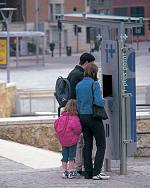Article
Londoners finding kiosks a big i-plus
Cityspace Ltd. is taking kiosks to the streets as a way to help London citizens interact with their local governments.
March 18, 2002
When local residents of London's Westminster City Council want to complain about dumped cars or faulty streetlights, they no longer have to wait until they get home to write a letter or send an e-mail.
Using i-plus, one of the latest sidewalk kiosks installed by Cityspace Ltd., a company whose
 |
Cityspace's i-plus kiosks let Londoners interact with local government right in their neighborhoods. |
To date, Cityspace has installed 100 i-plus points in five London boroughs and a number of other cities across the UK. The street-based information kiosks provide local, instant access to a digital network developed by Cityspace.
Gov't for the people
The local authorities are hoping that the street-based kiosks promote community involvement.
Cityspace commercial director Chris O'Donnell said, "The British Government is urging local councils to provide a platform that allows the community, especially those who don't have
 |
Cityspace's Chris O'Donnell. |
The i-plus points, with their toughened touchscreens, card readers and printers, are often installed in close proximity to other street installations, such as bus shelters. Using a dedicated ISDN line, a typical installation (not including the cost of the kiosk itself) can run to $8,000.
The attractor screen offers users instant access to local authority Web sites and a variety of other Internet facilities including free e-mail, `find your nearest', ticketing, job search, childcare, ITN news and transport information.
Local authorities can better afford the kiosks by granting Cityspace the rights to potential advertising revenues, O'Donnel said, though he doesn't expect much revenue to come from banner ads.
"We have never believed in banner advertising but we do believe we can make money from commission on sales and by charging for hosting commercial Web sites," he said. "For example, if a shopping channel wants to appear on our system we would make a charge. We could also offer banking or a myriad of other alternatives. It's a Web-based network, so the world's our oyster."
Trial by fire
To test the kiosks' vulnerability to vandalism, Cityspace set them up in a variety of neighborhoods, randing from Kings Road, which O'Donnell called an up market, to Southwark, which he called "less trendy."
"This was a useful exercise because we were able to compare differences in the way the i-plus points were used," he said. "Interestingly, the number of people who used the system was approximately the same and, surprisingly, the vandalism was no worse. We concluded that, if we could succeed in a major borough like Southwark, then we could succeed anywhere else in London."
The i-plus points are built by subcontractors. Content consists of links to local authority and commercial Web sites. Cityspace plays the role of infrastructure providers.
"We're an enabler," O'Donnell said. "We've had over 500,000 people access our system since it was launched, and because we track their use of the system from the moment they first touch the screen, we know enough to be able to advise our customers about how to present information and what will or won't work."
From credit cards to smart cards
Although credit card readers are fitted to the i-plus points, the kiosks haven't generated many transactions. The devices were added based on the results of focus groups conducted by Cityspace.
"The results were very interesting," O'Donnell said. "Asked if they would use their credit card in a street kiosk, everyone instantly said, `No!' However, later in the session we asked if they would buy a low-cost purchase such as a book or a theatre ticket using a credit card, and a significant percentage said yes."
O'Donnell said that the introduction of smart cards by London transport companies next summer will encourage card use.
"We will install smart card readers so that people can top up their subway or bus cards on their way to or from work. When the banks finally introduce a micro-payment system, the public's confidence in cards will be boosted and I think we'll witness a growing trend for small-value purchases at our kiosks," he said.
It's not the Web
Developing the i-plus point kiosks' content was a challenge for the Westminster City Council. Kevin Rainsbury of the Customer Service Initiative team responsible for Westminster City Council's Web development, said the team had to learn some new skills.
"From the outset we were on a steep learning curve," Rainsbury said. "Providing content for kiosks is not the same as providing content for the Web site. Greater thought has to go into download speeds, buttons, visible area and content."
It's a hit
The outdoor kiosks have only been in place since June 2001, but Rainsbury said that the evidence so far suggests that users like them.
"Initial evidence suggests that they have been received very well by Westminster residents, businesses and visitors who have clocked up thousands of hits," he said, justifiably pleased that users have found a new way to interact with local government.
"Improving access to Council services for all our customers is a key priority for the City Council and the kiosks are already helping towards our targets for electronic service delivery," he said.
The council is even considering additional kiosks.
"Whilst Westminster covers only a relatively small area, eight square miles, the population of 230,000, plus the number of visitors and commuters to Westminster every day, pushes this figure to well over a million," Rainsbury said. "We have only 18 (internal and external) kiosks covering the city at present and would hope to increase this figure quite markedly in order to reach the wider audience."
Rainsbury said that the most popular service of the Council's kiosk site is called Streetscene, an application that allows users to report litter, abandoned vehicles leaflet postings and other troublesome neighborhood problems to the council for action.
"Users are very keen on applications which are interactive. They like to know that what they are saying is being acted upon by the Council hence the popularity of the Streetscene application," he said. "So that we are in tune with our customers needs we will be making greater use of questionnaires on the kiosks in the future."
Speaking about the long-term, Rainsbury said, "Being able to offer the full range of services through the kiosks is some way off, but we have set targets to deliver all possible services electronically by 2005."
 ChatGPT
ChatGPT Grok
Grok Perplexity
Perplexity Claude
Claude









